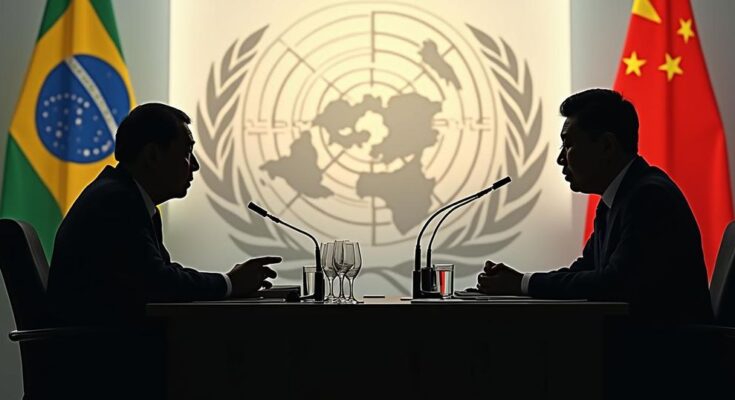China and Brazil are pursuing a peace plan for Ukraine’s war, despite Ukrainian opposition led by President Zelenskyy. Significant discussions occurred at the UN assembly regarding the war’s escalation and international diplomatic efforts. Concerns over China’s relationship with Russia were highlighted by U.S. officials, while Zelenskyy’s meeting with Donald Trump signifies the potential impact of U.S. politics on military aid to Ukraine. Finland’s military posture and ongoing military actions illustrate the conflict’s context as humanitarian efforts continue in tandem with military engagements.
On Friday, China and Brazil continued their initiative to garner support from developing nations for a peace plan aimed at resolving Russia’s conflict in Ukraine. This occurred against the backdrop of Ukrainian President Volodymyr Zelenskyy’s firm rejection of the proposal, which he criticized as favoring Moscow. At a meeting held on the sidelines of the United Nations General Assembly, attended by seventeen countries and chaired by Chinese Foreign Minister Wang Yi and Brazilian foreign policy adviser Celso Amorim, various critical issues were discussed. Notably, they focused on preventing escalation of the war, mitigating the reliance on weapons of mass destruction, and protecting nuclear facilities. President Zelenskyy previously expressed skepticism regarding the rationale behind China and Brazil’s alternative peace approach, asserting that such proposals merely create opportunities for Russia to prolong the conflict. Following this, U.S. Secretary of State Antony Blinken articulated concerns regarding China’s support for Russia’s military capabilities. He pointed out that although China claims to seek an end to the Ukraine crisis, its companies are facilitating actions that perpetuate Russian aggression. Meanwhile, South Korea’s foreign minister reiterated suspicions about an illegal arms trade between Russia and North Korea, which corroborated reports from the U.S., Ukraine, and independent analysts regarding North Korea’s provision of military support in exchange for economic assistance from Russia. Additionally, during the UN assembly, Korean officials decried Russia’s misuse of its veto power at the United Nations Security Council as a significant barrier to peace initiatives. President Zelenskyy engaged in a crucial meeting with former U.S. President Donald Trump, aiming to mend ties amidst escalating tensions with Republican allies over the future of American military aid to Ukraine. After their discussion, Zelenskyy referred to the talks as “very productive,” emphasizing the need to halt the war and ensure a Ukrainian victory. In a show of military readiness, Finland announced the establishment of a NATO base in close proximity to its border with Russia, reflecting its shift from a stance of military non-alignment following Russia’s invasion of Ukraine last year. Meanwhile, Russian claims of territorial progression in the Donetsk region were met with contradictory reports from the Ukrainian General Staff, which noted ongoing resistance against Russian advances. Additional troubling developments included the initiation of a trial against a 72-year-old American citizen in Russia accused of mercenary activities, a missile attack on Kryvyi Rih resulting in multiple casualties, and the return of Ukrainian children previously deported to Russia, facilitated by Qatar as an intermediary. Lastly, Romania reported a brief incursion into its airspace by a Russian drone during an attack on Ukraine, underscoring the ongoing volatility in the region.
The context of the ongoing Ukraine conflict and international efforts for peace is crucial to understanding the dynamics at play. Since Russia’s invasion of Ukraine in February 2022, various nations and international organizations have been seeking to mediate peace and provide humanitarian support. China’s and Brazil’s attempts to establish a peace plan come amidst criticism from Ukraine, reflecting the complexity of global diplomatic relations and the differing perspectives on resolving the conflict. As developing countries align on their positions regarding the war, geopolitical tensions escalate, particularly in light of the United States’ critical stance towards nations perceived to be supporting Russia. Furthermore, the implications of U.S. domestic politics play a significant role in shaping the future of military aid to Ukraine, as was demonstrated in President Zelenskyy’s meeting with Donald Trump.
This briefing encapsulates the complexities surrounding the Ukraine conflict, highlighting divergent approaches to peace and the intricate interplay of international relations. While China and Brazil strive to present a united front for peace, their efforts face significant resistance from Ukraine, emphasizing the challenge of finding common ground in the face of geopolitical tensions. The ongoing military incidents and diplomatic discussions underscore the urgent need for comprehensive solutions to restore stability in the region, while maintaining global diplomatic relations. The role of major powers, including the United States, remains pivotal in influencing the trajectory of the conflict and potential pathways to peace.
Original Source: www.theguardian.com




